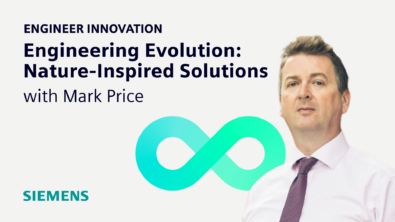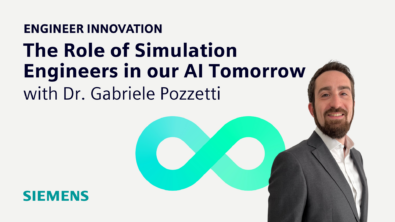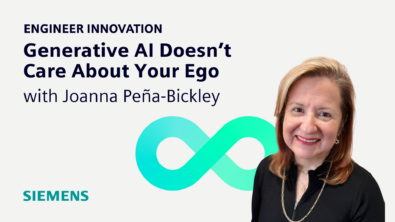The Past, Present and Future of CFD with Dr Simon Fischer (Season 2, Bonus Episode)
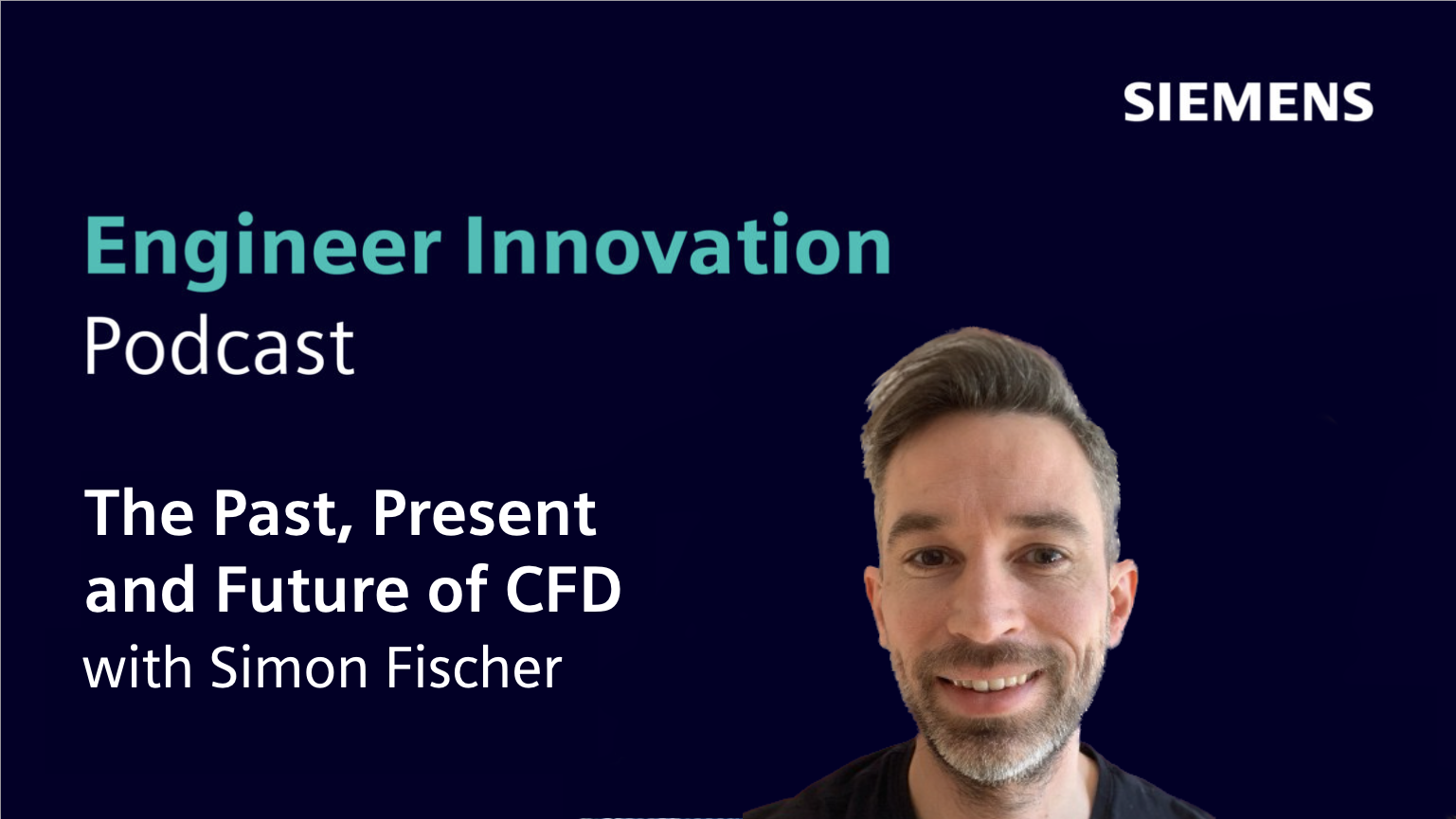
On today’s episode of the Engineer Innovation Podcast, we’re joined by reformed engine combustion simulation expert Dr Simon Fischer, who traded in a stable career in engine simulation to become an expert in storytelling through simulation. In this episode we discuss
- Why Simon decided to get out of the engine simulation game.
- Which sort of CFD engineers are the most competent
- How the scope of CFD has, and is still changing
- The value of a multidisciplinary approach to simulation
- The risks and benefits of Artificial Intelligence and Machine Learning
- A cat wearing a frog hat
- Massive Engineering Data Analytics
This episode of the Engineer Innovation podcast is brought to you by Siemens Digital Industries Software — bringing electronics, engineering and manufacturing together to build a better digital future.
If you enjoyed this episode, please leave a 5-star review to help get the word out about the show.
For more unique insights on all kinds of cutting-edge topics, tune into siemens.com/simcenter-podcast.
- Why Simon decided to get out of the engine simulation game.
- Which sort of CFD engineers are the most competent.
- How the scope of CFD has, and is still changing.
- The value of a multidisciplinary approach to simulation
- The risks and benefits of Artificial Intelligence and Machine Learning
- A cat wearing a frog hat
- Massive Engineering Data Analytics
SUMMARY KEYWORDS
simulation, cfd, artificial intelligence, machine learning, engines, combustion, multiphysics
SPEAKERS
Stephen Ferguson, Simon Fischer
Stephen Ferguson (00:03):
Hello and welcome to the Engineer Innovation Podcast. With me today is Dr. Simon Fischer, who is a Siemens engineer and a friend of mine. So let’s start off Simon by asking you to introduce yourself and tell us what you do at Siemens.
Simon Fischer (00:18):
Yeah, thanks very much for having me. So I’ve been with Siemens for almost a decade now, which is crazy. So I’ve been starting as a technical support engineer on internal combustion engines. So I don’t know if you are allowed to say that anymore on public media. And then after five years I turned into a marketing engineer. And since then, now half of my career at Siemens I spend in marketing basically.
Stephen Ferguson (00:48):
So basically you wasted your talent. So the first time I was aware of you was when I was working in marketing. And the name Simon Fischer kept coming up as some technical specialist to do with engine simulations. I’m not sure if it’s true now. Back in those days, the whole of the CFD industry seemed to be split into two. You had regular CFD guys who did a bit of everything, and then you had engine guys who were so clever and dealing with the most complex problems that they only ever dealt with engines. So having made that jump from engines to all round regular CFD genius is quite an achievement, isn’t it? Because I guess most of your colleagues you worked for in those days are still doing engine simulations.
Simon Fischer (01:33):
True, yeah. And the funny thing is that the comment I wasted half of my career came-
Stephen Ferguson (01:40):
Which half?
Simon Fischer (01:42):
That, exactly that. The comment came when I announced that I would be changing to marketing basically. I haven’t answered to myself, I wasted no part of my career so far. I’ve done my PhD as well on internal combustion engines or even worse exhaust gas aftertreatment. So after 10 years in the field, I felt like, “Do I really want to go down that road?” I’ve seen a lot and maybe enough for one life about combustion simulation. And I felt like, “Okay, I can only go deeper and deeper.” And I felt it’s enough, at least for my life.
(02:31):
And yeah, I was just looking for something else. I didn’t know what it was at the time. And then it was not really a planned move to go into marketing. I wasn’t really aware that this would be something that could be of interest to me. I stumbled over one of the internal job announcements, Reddit, and I felt like, “This sounds like I would combine the things I love to do in my private life with the things I do professionally.” And that was basically when I called you up back in the days and said-
Stephen Ferguson (03:06):
And so I can still remember taking that call and thinking, “Oh my God, this is Simon Fischer, he’s an engine guy. He’s never going to enjoy this job. It’s never going to fulfil him.” But I was completely wrong as well I think. I think it’s been a really good transition for you. I think five years ago was probably pre Greta Thunberg, wasn’t it? I think the world changed with Greta and everybody’s a lot more conscious about environmentalism and CO2 emissions.
Simon Fischer (03:34):
True.
Stephen Ferguson (03:35):
Was part of your decision to move out of engine simulation, was it an environmental? Did you see the way that things were going? I don’t know what the exact figures are, but I think a third of all cars sold in the UK were electric last year. And that’s only ever going to increase from now on, isn’t it? So was that part of your choice?
Simon Fischer (03:55):
There were a bunch of things. The story I always tell is when I used to go downtown with my wife, we passed by that Tesla store, which was right on main street. They have these flagship stores in the middle of the street. And it always made me feel uncomfortable moving beyond. And people were starting… My father was starting to ask me, “Is this the future still? What do you see?” For me, engines have always been a playground. As a physicist, I didn’t really care about cars, honestly. It was a playground because there’s so much physics in an engine, and that was what attracted me, all the things going on.
(04:40):
But indeed, it was part of the decision because I felt like whether or not this is real and whether or not electrification is the answer to everything, I didn’t really have an answer or don’t have an answer to that. But the public pressure and the feeling that I wouldn’t own my career all the time for a foreseeable future made me maybe nervous, let’s say. And I felt like I don’t want to be pushed to another position, I want to own it, and I want to move on by myself. I have met so many brilliant engineers in IC engine development. These are all amazing people. And I think that the challenges remain the same regardless of the powertrain solution. But still-
Stephen Ferguson (05:33):
I think they’re the most amazing people. I think we take some of these things for granted now. But back when I was a CFD engineer quite a long time ago, motion was a difficult thing to do. It’s getting easier, but it’s still a problem. Fully transient simulations are difficult. Multiphase is difficult. Chemistry is difficult, combustion is difficult. So the people who got drawn into that, in my experience and in my career, were generally the cleverest engineers. So for sure, I take your point that those are the cleverest people.
Simon Fischer (06:03):
And for me, there’s two reasons why you move into that direction as a young engineer. One is you’re like a petrolhead addict. Modena, everybody wants to work for Ferrari at one point in their career. I was never that person. And there’s this other breed in that field, and these are the people more like me than… It was an accident that I ended up there to be honest, I didn’t really plan to be in the automotive industry after all. But physics was what attracted me and fluid dynamics was it. And as you said, there is merely any application that is so complex yet so established over decades like the things we did for combustion engines back in the days and still do. So yeah, clearly that was quite a nice playground to look at. But also at some point it feels like you’ve seen it all. It’s enough, not another of these cases. Still it was exciting to work for Formula One teams and stuff like that, support those guys, see how they work, and it’s crazy. I enjoyed it a lot. I was travelling a lot all across Europe, seeing so many different OEMs and all Formula One teams at a time. So it was super impressive and it was super fun. But at one point it didn’t give me anything new, anything additional. I would say, maybe it’s a bit boring to say, but I’ve seen it all in that field. For me personally, it was enough.
Stephen Ferguson (07:42):
So your current role at Siemens is you’re in charge of marketing. I think it says for fluid and thermal solutions, which to me, and you can correct me if I’m wrong, is basically CFD, isn’t it?
Simon Fischer (07:55):
Yeah. Yes, it is. It is CFD. And when you say fluids and thermal, the thermal aspect predominantly comes in because that’s the part I was also new to is the whole electronics cooling business. That’s the thermal implication predominantly. When you hear about CFD, you wouldn’t immediately think about electronics cooling. But obviously if you look around you, it’s huge. Electronics cooling is equally as huge as everything else when it comes to flow and cooling things. The challenge in electronics cooling is really about all these tiny… So the length scale of where this CFD happens is a different one compared to what you… If you have aerodynamics of a car, that’s an obvious CFD implication. If you have the cooling of your mobile phone and the microchips inside there, it’s a different length and timescale. But after all, it’s also a CFD, it’s a fluids and thermal problem. So that’s what it is. And CFD-
Simon Fischer (09:02):
Thermal problem, so that’s what it is. And CFD, in today’s understanding, CFDs by far more than just single face flows. So that’s fluids and thermal, basically it is CFD in a very broad meaning, I would say. We also simulate particles and stuff these days and reacting flows as we already mentioned. So CFD has become more than just single phase flow. So it’s really yeah. It’s a lot.
Stephen Ferguson (09:38):
It’s a multiphysics solution as well. Something I’ve written before is that people are not interested in solving single phase flows anymore. All the… Have already been solved, haven’t they? And so increasingly, you have to include all of the physics to make your solutions and your simulations correct and relevant as well.
Simon Fischer (09:58):
Yeah, I used to-
Stephen Ferguson (09:58):
So it’s about reducing approximation.
Simon Fischer (10:01):
Yeah, I used to have that. It was a stupid fight. It was just for fun, but I used to have that fight with our technical specialist for external vehicle aerodynamics back in the days because he used to say that this is the king discipline of CFD, because yes, you can do full-blown, large area simulation and whatnot. So the fidelity can be really high in aerodynamics. But I was always like, “Come on. Are you kidding me? This is single face flow.” I’m upsetting a lot of people that make living from aerodynamics, but I felt like there is some gears to shift up in CFDs.
(10:40):
And aerodynamics is still coming back to sustainability is a very big lever, making things move through a fluid more efficiently is a big thing regardless of the powertrain. But AI, the real world around us is all multi-faced. Honestly, the word multiphysics, I sometimes struggle with. It’s just physics. It’s all physics. It’s multidisciplinary for me. We brand ourselves with multiphysics, which I’m not happy with. I don’t know who came up with [inaudible 00:11:12].
Stephen Ferguson (11:12):
It’s a good point. It was probably me, Simon. So you can blame me for that as well. So I think that, yeah, I’ve been involved in CFD since 1993, so 30 years now as well, which is an incredible amount of time, I think. And the industry has changed a lot. So when I first left university, I was an aero engineer, an aero guy, and I was a fluid mechanics guy and I always did CFD. And I sat in the same office with the stress guys who only did finer elements and the 1D guys who did system stuff. But in reality, we exchanged little information, little simulation data, and we didn’t understand each other’s specialism at all… principle stress and [inaudible 00:12:00] stress. I used to sit and listen to these guys every day, but it wasn’t my expertise and I wasn’t interested.
(12:05):
Do you think that modern engineers are having to be more multidisciplinary, masters of more different application areas and disciplines than… You are 10 years younger than me, but I guess you went through a similar experience at the start of your career.
Simon Fischer (12:20):
True, yeah. So I have half of the time. I have 15 years more or less in CFD. The good news is in 2008 when there was this economic crisis, I was forced to change topics in the middle of my PhD. Projects were cut down by industry, so I had to jump out of the whole CFD business. I went into system simulation for a year and that was very useful for me still in my career. In hindsight, I felt like I lost a year on the topic I was researching for, but reality was actually that I still benefited from it. If I now talk to you, and you can… Obviously CFD cannot be isolated or has never been isolated. System simulation is a very close friend to see if it’s just to provide some boundary conditions or to feed back some results into a fast running model. These days, it would be like an FNU or really a pre-calculated, quick running model in the system. So system simulation has always been very close to CFD and I think this is really useful for, or it was really useful for me in my technical conversations back in the days to also understand a bit more of the system simulation world.
(13:48):
I, personally in my career, have not pushed that any further. Now, I really appreciate talking to one of our product managers who is looking after fluid structure interaction. So this is really the FEM part of things that are very fascinating. That’s one way I’m very interested in, but as I move to marketing, I’m not going deep down into these technical engagements, but my feeling is yes, every engineer and even more so, the younger engineers, they need to have this broader scope of things to stay in the market and stay competitive. But is it a challenge? Clearly, yes. CFD on its own can be a lifetime work. Understanding all the details of fluid mechanics can be a never-ending journey. But [inaudible 00:14:40] also means that you need to engage way more with other disciplines, both on the engineering level and also on the software level. That’s what we see in software development. The trend is clearly towards more integrated, more multi, multi, multi multiphase, multiphysics, multi whatever. So it’s really a clear trend that is required.
(15:00):
And one thing that I just learned these days where I felt like this is another of these moments with the move from internal combustion engines to a broader scope. Right now what makes me, I don’t want to say nervous, but what I see happening is the whole move towards AI things, which puts the whole CAE engineer thinking upside down or feels like, let’s say. The whole thing. AI could replace simulation, which is not true, but which is out there. People start thinking about the ways they can engage with this technology that could replace very heavy simulations if done right.
(15:41):
This is something that I really want to engage with these days. Even in my marketing role, I clearly see that if I don’t continue my self-education on that topic, I’m just risking my knowledge. So that’s one where I feel like this is one of the examples where I feel I as an engineer need to move on and I need to broaden the scope.
Stephen Ferguson (16:08):
Yeah, because in any company, engineers are really expensive assets, aren’t they? So towards the beginning of my career, maybe 15, 20 years ago, we were seeing the arrival of CAD embedded CFD. So my generation of engineers, I was one of the first. You’ve got a PhD. I was one of the first people in the company I worked for to ever work as an engineer without having a PhD. I only got a master’s degree. I wasn’t an intellectual like everybody else. And in those days, you had to have a PhD to even work in CFD and then all this CAD embedded stuff came along and CFD became easier to use. And it is easier to use because I spent the first 10 years of my career as the mesh monkey in text files placing every single vertex. Now, you take it for granted, but that’s completely automated.
(16:55):
So we’ve seen that transition. Everybody warned us. “Oh CFD’s getting too easy. People will abuse it. You’ll get the wrong people using it. People like you will be out of a job.” And that hasn’t come to pass because actually, in lots of ways, engineering simulation, although it pays our wages, yeah, it’s a necessary evil. It’s the in between step. We are simulation engineers because simulation is still quite difficult to do. But what we want to be doing is not building meshes or twiddling under relaxation factors or trying to understand physics models. What we want to be doing is me making meaningful decisions based on the output of simulation.
(17:35):
And so my view is that AI is going to take another step on that journey to making, well, first of all, the process of running simulations a lot easier as well. One of the examples I’ve seen is for Underhood simulations where any time you work with a complex assembly, lots of the time it’s just sorting out CAD parts, isn’t it? And identifying things so that you can put meshing parameters on them or boundary conditions, or you can flag them for post-processing, that sort of thing. If you go into Google now and asked it to find-
Stephen Ferguson (18:03):
Post-processing, that sort of thing. If you go into Google now and ask it to find a picture of a cat with a frog hat on its head, it will find it because it knows that AI algorithm. So I think AI is a good way of taking some of that donkey work out of CFD simulation, all simulation. Would you agree?
Simon Fischer (18:18):
I agree. But coming back to what you said initially, I think it’s a misconception to correlate the fact of whether a tool is easy to use and whether… Yes, there is a risk that some portion of engineers would create push results because now they are easily able to create those results. And in the past, the simulation would’ve crashed maybe if you didn’t exactly pay attention. But, to me, there is no clear correlation, or it’s a misconception of these people that claim for themselves to be the super experts on CFD, nobody else should be using it. The democratisation of that part, I think what it comes down to is, whatever you do, you need to be very critical if you do simulation in the results you generate, regardless of whether the tool was very easy to use or not. When you have the results on your table, you need A, some fundamental understanding of fluid dynamics. I agree with that. It helps.
(19:17):
But honestly, in my whole career, I never read a CFD book from start to finish. It may sound a bit like discrediting to me and that’s why I ended up in marketing, I don’t know. But honestly, when I had results on my table, I was looking at the results and I started to A, compare them to experiments if available, to common sense. And I tried to then learn while critically reviewing the results to understand, does this make sense from a physics engineering perspective? But it doesn’t mean that you need to twiddle URF factors or whatever for ages or yes, Y plus matters, but you can play around with Y plus for ages and it’s not the point anymore. It’s a bit like comparing, it’s like the only source of proof in coding is a sampler code. No, it’s not.
(20:07):
I mean, we have developed high languages in order to make it easier to code, like low-code applications. Doesn’t mean that you will do only shit with it. So I feel that it is a bit similar if we improve the way we use a tool afterwards. CFD is a tool with a very delicate science behind it. I agree with that. But you need to be able to judge the results of your simulation, how you got there. The faster and easier it is, the better. The risk is with AI, maybe there is a certain risk that when AI makes a decision that you are not aware of during a simulation run or simulation set-up or decision making, there might be a risk you couldn’t judge the boundaries of your simulation anymore to some extent, unless the tool is also giving you your feedback on the choices made or the things done. So I think you always need engineers that could make that judgement, but if it’s easier to generate a mesh, then make it easy. Right? There’s no added value in the mesh, like you said.
Stephen Ferguson (21:18):
No. It’s just an intermediate step, isn’t it, as well? So the other end of that of course is that through simulation, as we do more simulation and simulation becomes even more important, we end up generating lots and lots of simulation data. And I think a real use case for AI and machine learning is to extract more value from that data because it’s often that’s the most disappointing thing about doing CFD sometime, is you put all this effort into getting a complicated simulation running, you run it a few times, take the results and then it’s back in storage. In my days it used to be on a data tape. These days it’s probably on a cloud. So extracting more useful information from simulation data I think is a proper use case.
Simon Fischer (22:01):
Yeah, absolutely. I mean both in the pre-processing step, like just getting your simulation set up quicker. I think that’s one, like intelligent DUIs that would anticipate what you are about to do is one thing. Making your life easier in the pre-processing step and in the post-processing step, I absolutely agree. Just getting help by a tool to find patterns that you wouldn’t have seen otherwise, because there is data spread all across the company, globally, whatever. And just making meaningful or gathering meaningful insight from that big data pool that sometimes is disconnected in the first place I think is very useful. I’ve been a very big fan of, or I’ve been spending a lot of time, it’s not AI, but on design exploration for a long time. My professor used to say, “Do something once, it’s okay. Do something a second time, it’s still okay. The third time you do something, you would want to automate it.”
(23:08):
And that’s the first step in CFD. Also, you don’t want to run the single simulation, you want to run once you have the first one, you want to have a model that’s so automated and automateable that you can easily sweep through various designs. And the next logical step is then do proper design exploration. And I’ve been really addicted with that because you can generate huge databases without any human intervention. So you don’t waste engineering time. So you just waste the cluster. And as I was in support, we had a huge cluster, just piss off a few people, but when there is a gap, then you would run 500 cases after. At the end of it, you would realise, yeah, okay, maybe 100 more smart choices would’ve done the same job. But anyways, now it’s done. And if you then have a tool to look into the data out of 500 CFD simulations that gives you, I was making the claim that I was competitive with…
(24:07):
So in the combustion engine, again, that was an example. There is this, a typical thing is that you would like to have the best possible spray pattern in the time domain, right? You would like to know when to inject how much fuel in the engine during the whole process. And I was just using design exploration to optimise the spray pattern for certain things. And I learned in like, it took me a week to set everything up, then it ran for a week maybe. And after two weeks I got so many insights that a classical engineer would only have gotten over years, I would claim, to do these sort of one-off tests. So creating this big dataset with sophisticated simulation might be sort of expensive, but the engineering insight you might get from it, if you have the right tools to explore that big data set, is amazing. So you can really increase your learning curve massively by this strategy, I feel.
Stephen Ferguson (25:11):
And also as well, I mean another application of AI and machine learning is that, so you’ve talked about doing a design sweep where you simulate lots of points, but you are only ever going to be able to simulate a finite number of points. And once you use machine learning, you can use… I’ve seen good examples where machine learning, so basically it was a thermal comfort solution for the inside of a car and they run of order thousands of scenarios, but once they had that data, they could use that to train a machine learning algorithm and put additional scenarios that were never ever simulated and the algorithm could produce number output and also graphical output predicting what the outcome of those simulations that had never been performed would be as well, almost instantaneously as well.
(26:00):
Now of course, you don’t want to trust those simulations as your final solution and if you want to pick out a couple of good ones, you’re going to need to run them again. But that whole thing about in the old days, we used to go in on Monday morning after running our simulations all weekend, make some design decisions and have to wait another week. The reality is, quite soon you’ll be able to make some preliminary assessments of what the next design changes should be in the meeting as well. So that’s another huge potential use of AI and ML. But like all of these things, one that has to be used carefully as well, because I think, you know.
Simon Fischer (26:37):
Yeah, true. I mean, two things here. That’s the next step. I just talked to an AI tech specialist yesterday. The next big thing is that it would even use AI on the fly as it does the design exploration and make a smart decision of whether it calculates the next point in this design space or it uses AI to make a prediction of that point and move to the next one, which is kind of insane if you think about it. You combine two technologies.
Simon Fischer (27:03):
… which is kind of insane if you think about it. You combine two technologies that both are kind of black magic to me and to even the next steps. So it would not just be run these 1000 points and then run your AI over it and you have your reduced model and do predictions or whatever with it. You would do that on the fly and the code is smart enough to make a decision whether or not it would go down the simulation route to create the design space or it would use AI to predict that point and move on. That’s number one. And the second point with all that, it is again, this is very… If you as an engineer don’t start to engage with these technologies, you can argue I’m still smarter and I have more knowledge. And at the end of the day, me as an engineer needs to make the final judgement.
(27:47):
Yes, true. But if you stay in that thinking, you just miss out on a very effective tool and that will make you obsolete sooner or later. You just need to use… Every tool, you need to use it reasonably, I feel, but it would never replace a human being. That’s why I’m not really scared about AI. To me, [inaudible 00:28:11] design exploration or however you call it’s a source of inspiration in the engineering world after all. Still you create big data. Yes, you see correlations you haven’t seen beforehand, but sometimes and oftentimes it’s not like the one optimum that the code spit out that you would go for because the world is more complex than what the problem you initially described. So you have other things to bear in mind and you never have the full-blown spectrum even in your design exploration or AI model.
(28:41):
So as an engineer, you get inspiration even from big data insights to make the next move, but on a way more sophisticated level I think. So that’s the way you need to look at it. It’s not a competition to engineering, it’s just engineers get another very powerful tool in their hands and they should make the best out of it. I think that the biggest strong point in human beings, even in engineering is sometimes you just do something counterintuitive, crazy, whatever, and that’s what sets us apart from the whole AI sort of thing, because doing something stupid ends up sometimes in the most successful products or whatever it is that you are after, even in engineering, I think that’s true. Or it’s coincidence, you made a bad mistake in your set-up. It turns out it’s actually not that bad. These sorts of things happen and they are important.
Stephen Ferguson (29:44):
Yeah. So we’re almost out of time now and we’ve talked about the evolution of CFD through your career. You just talked about how sometimes the best moves are the counterintuitive ones. So it’s a bit like you abandoning a nice safe career in being an engine guy and going into the crazy world of marketing. But I guess I think for me, having known you for a long time, actually one of the most important skills in engineering is communicating. It’s about interpreting results and being able to communicate complicated ideas to a non-specialist audience. And actually what I’ve seen you do personally over the last five years is I think you’ve done that better than almost everybody else in my experience as well. So I guess that was your calling in lots of ways. The communication aspect of being an engineer is something that you’ve really excelled in. You needed your technical background to do that for sure. But I think you’ve done a really great job of that.
Simon Fischer (30:41):
Thanks. So I see my career as follows. I started in physics, so I’ve been doing hardcore quantum mechanics back in the day. So I was like at Schrödinger equation level and I know [inaudible 00:30:55] engineers now. And then the next step in the career was the Navier- Stokes equation. Okay, it’s still non-linear. It’s still hardcore stuff, but it’s not quantum mechanics. And then I did a lot of Navier-Stokes stuff and at least it was still proper engineering. And now I’m at Excel and PowerPoint and LinkedIn. Still everything I do, I benefit from every of these steps. I mean, funny things in fluids and thermal, we also have queries there. So we have molecular dynamics simulation, which is a totally different beast, which solves anything from Newton to Schrödinger equation.
(31:38):
So I’m back at square one to some extent, but that’s the thing, I can talk to these engineers and translate what they say and I’m in the lucky position having that background to understand what they say to some extent, not all the details, I don’t care anymore or I couldn’t care anymore, but I understand what they say and what I really enjoy is translate that into something that even my kids would understand. That’s what I love about my job and that’s why I feel my profession. I’ve always loved to stand in front of people on the blackboard back in the days using a piece of chalk and explaining to my mates my thoughts. That was very powerful in having really hard discussions about things, why it’s wrong or not wrong and stuff like that. So I always enjoyed that part and I think that’s why my career decline is the best thing I’ve ever done because I’ve found a profession in what I do right now.
(32:39):
It’s really about that, like taking complex engineering stuff and I’m excited about fluid dynamics. Anytime I walk through the world, I see all these things that flow and I’m still that engineer or kid or whatever you phrase it, that then tries to explain to his wife what is so exciting about that flow and that thing. But I try to make it tangible and that’s the thing I really enjoy. And I think engineering as a whole and making people aware of all the things they use around them, are not there as a coincidence. It requires a lot of smart people to invest into those products that make your living so nice, easy, whatever it is, more sustainable hopefully at some point or continuously until we reach what we need to reach. So yeah, talking about that and making it tangible and explaining it to people is what I think technical marketing is the perfect role to do. So really, I don’t know where else to go to be honest.
Stephen Ferguson (33:44):
And I think you are the perfect person to do that as well. So you just said that you managed to explain to your wife what fluid mechanics is all about. I think I’m going to ask you to explain to my wife, because I’ve been trying for [inaudible 00:33:55] years and she doesn’t have the first idea what I do for a living. So I just wanted to finish off by saying thank you very much, Simon. You’ve been a great guest and thank you for joining us on the Engineer Innovation Podcast.
Simon Fischer (34:04):
Yeah, thank you as well. It was my pleasure.

Stephen Ferguson – Host
Stephen Ferguson is a fluid-dynamicist with more than 30 years of experience in applying advanced simulation to the most challenging problems that engineering has to offer for companies such as WS Atkins, BMW and CD-adapco and Siemens. Stephen played an integral role in enticing Simon away from the world of combustion simulation.
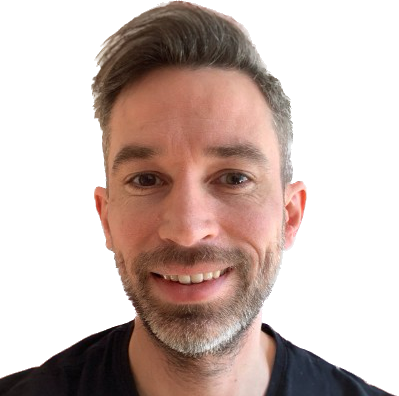
Simon Fischer
Simon Fischer describes himself as an engineer by heart and a marketer by accident. He started his career studying physics, which introduced him to particle flows and fluid dynamics, which eventually led him towards a CFD focused PhD in automative exhaust gas aftertreatment systems. After five years as a support engineer at Siemens for internal combustion engine CFD, he moved on to marketing.
Simon is now the manager for Simcenter fluids and thermal solution marketing, looking after CFD, electronics cooling and computational chemistry products.
Take a listen to a previous bonus episode of the Engineer Innovation Podcast. The truth about AI in engineering with Jousef Murad (Season 2 Bonus Episode)
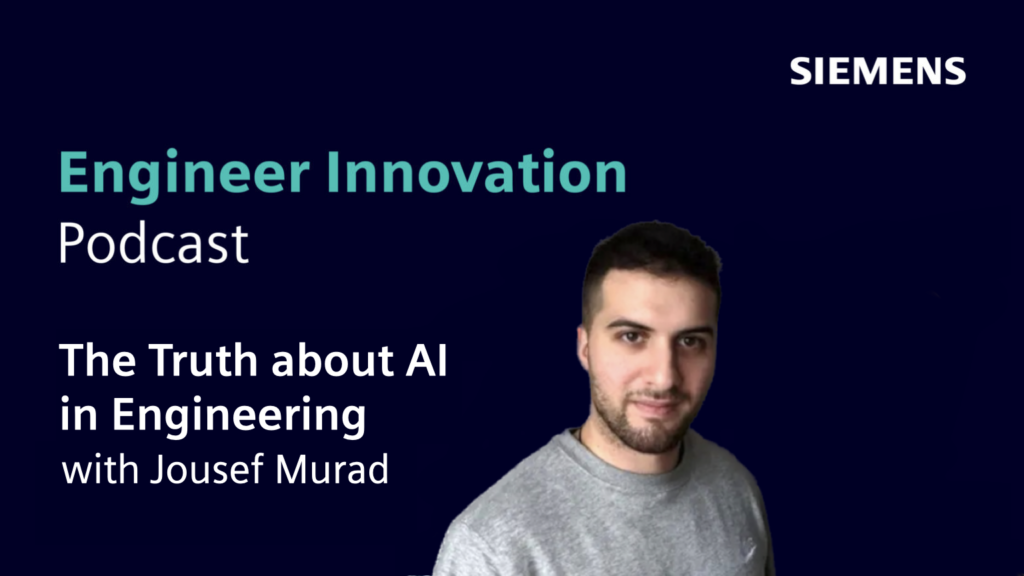
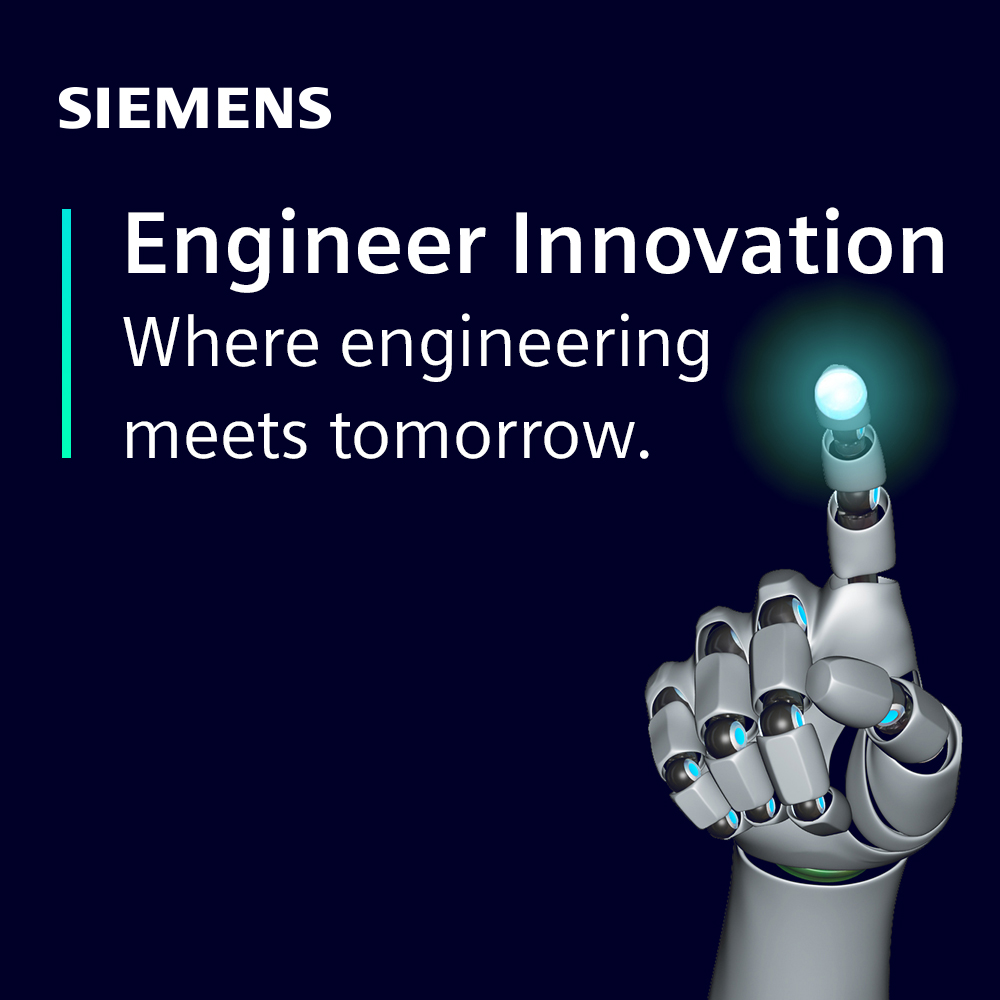
Engineer Innovation Podcast
A podcast series for engineers by engineers, Engineer Innovation focuses on how simulation and testing can help you drive innovation into your products and deliver the products of tomorrow, today.
